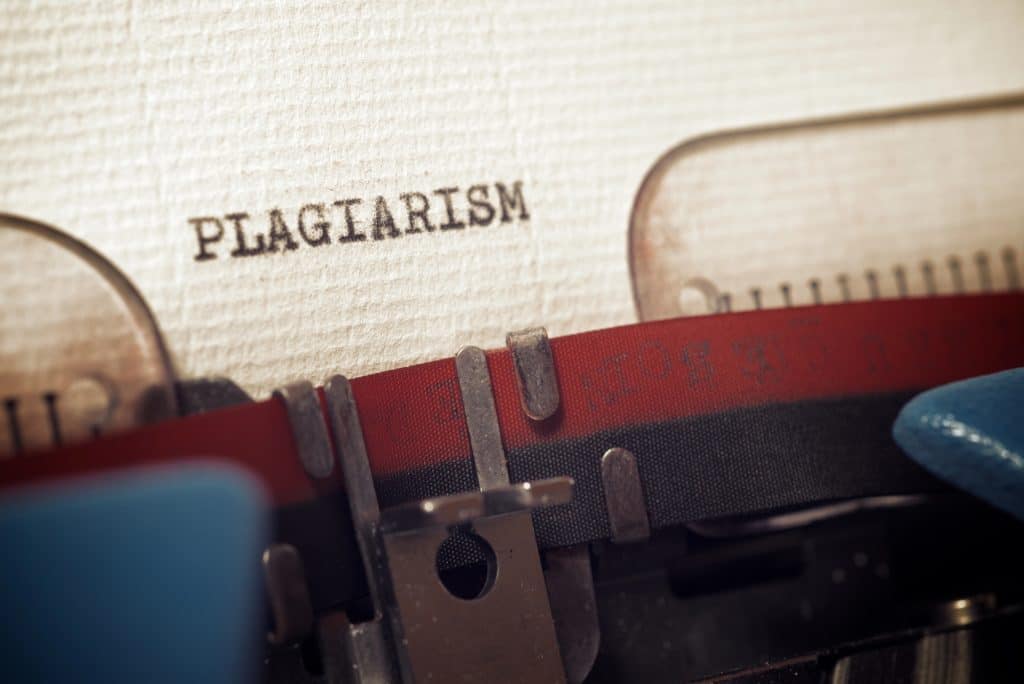Every researcher, student, or writer has probably experienced a creative block. No matter what you do or how much you read, the words never seem to come as easy as they usually do. Before you know it, you’ve probably been staring at your screen for hours, with only your cursor blinking back at you.
It must have crossed your mind once or twice — what would happen if you were found to copy someone else’s work and claim it as your own? The truth is, most people only have a vague idea of what plagiarism is, and they seldom understand the consequences of copying someone else’s work or idea. Understanding why this is wrong is simple enough, but the question is this: why do so many people never get tired of doing it?
Table of Contents
What you need to know about plagiarism

When people think of plagiarism, the first thing that comes to mind is copying or borrowing someone else’s writing word for word and not giving credit where it is due. However, while that idea may be correct, it doesn’t exactly cover the whole scope of the term. The words “borrowing” or “copying” reduce the impact of what plagiarism actually is — literary theft.
It is essential to understand that when you plagiarize something, you are technically committing an act of fraud. Not only are you claiming credit for something you did not originally make, but you took it from someone as well without any type of notice or consent.
Just like anything else, words and ideas can be stolen. In fact, these are considered to be intellectual property under the laws of the United States. As long as they are recorded in any way (in writing or digitally), then they fall under the copyright protection law.
There are different ways to commit plagiarism, and you may even do it accidentally or unintentionally if you are not careful enough. The idea of unknowingly committing fraud can be intimidating. In order for you to avoid plagiarism altogether, it would be helpful to get a full primer of the many ways you can commit this type of fraud.
You might also benefit from exploring how to avoid plagiarism and copyright infringement, which delves deeper into practices that can help you steer clear of both issues.
3 common ways people commit plagiarism
As mentioned, plagiarism is more than just copying or borrowing someone else’s work and claiming it as your own. There are a lot of ways people commit plagiarism, and not all are due to ill intent. Sometimes, carelessness causes plagiarism, which is why you need to be aware of what you need to look out for to avoid plagiarism.
Here are some of the most common ways people commit plagiarism (whether intentionally or accidentally):
Submitting somebody else’s writing as your own
This is one of the most common types of plagiarism, and it’s quite interesting how some people think that they could get away with this. Submitting a full body of work is incredibly apparent, especially if the writing style or thought process you usually use is different from what you’ve sent.
Failure to use quotation marks
Quotation marks may seem like insignificant symbols to some, but using these signs means that the words you are using are not exactly your own. By failing to use a quotation mark, it immediately gives the impression that you stole someone else’s work word for word. To indicate that you got the words you included in your writing from others, enclosing the statement in quotation marks and citing the source would be helpful.
Not giving credit to the author when you use their words or ideas
Apart from copying the exact words of the original author, failing to mention their names in your work in the form of a citation is also a common type of plagiarism. It is crucial that you give credit to the author if you want to avoid committing plagiarism.
Apart from the ways mentioned above, there are other ways you can commit plagiarism intentionally or accidentally. You can copy the whole sentence structure and just change the words in the sentence, give false or incorrect information about the source of the words, ideas, or information, or copy a bulk of ideas from a single source in your body of work such that it is mainly composed of that work alone. It would be ideal for you to study plagiarism in detail to avoid committing it altogether.
For a more comprehensive understanding, looking into the broader topic of copyright and plagiarism may also clarify how these concepts often overlap.
How can plagiarism be accidental or unintentional?
This is where things can get confusing — can you really commit plagiarism if you unintentionally or accidentally did it? Isn’t intent a key factor when performing an act of fraud? If a person did commit plagiarism accidentally, are they really at fault?
The short answer is yes, it is possible. So many people, especially inexperienced writers, accidentally commit plagiarism by not writing their content properly or not citing their sources accurately. Simply put, if the reader can assume that you wrote the words because of improper citation or paraphrasing, then it can be considered plagiarism.
Therefore, it is imperative that the reader understands who is speaking when they are reading your work. They should be able to recognize when you are expressing your own ideas, if you are discussing and analyzing others’ ideas, or if you’re directly quoting someone’s words to explain your point further.
Resolving unintentional or accidental plagiarism

There are various reasons why people can accidentally commit plagiarism. For the most part, it’s not because they want to steal someone else’s idea and take credit for it themselves. Instead, accidental plagiarism is an after-effect of carelessness and lack of attention to detail.
People who do accidental plagiarism would fall under any of these categories:
- They do not know how to cite resources properly
- They do not know that their way of writing falls under the umbrella of plagiarism
- Due to rushing their work, they failed to properly quote their sources
- They accidentally wrote down the idea from a source they read without crediting it properly
If you accidentally plagiarized someone’s work and you want to resolve it immediately, here are some things you can do:
Fix your citations and credit the author properly
If you weren’t able to fully cite your source or you failed to credit the author altogether, then you should rectify that by learning the correct ways to do citations. There are templates online that show several ways to cite authors, depending on the type of content you’re copying from them. Revise your references or bibliography area and include proper markers in your work to show that you got the idea from someone else.
Learn how to paraphrase properly
Some people think that paraphrasing is as simple as changing a few words in a sentence and calling it a day. However, you should know that using synonyms and changing the words in a sentence still counts as plagiarism. To paraphrase an idea correctly, you should also change the structure of the sentence and paragraph completely while still crediting the original source.
Citing too many sources
Don’t get us wrong — it is not wrong to mention your sources if your work needs those ideas to take flight. However, if you cite too much of others’ works that it seems like your whole paper is made up of citations and quotations, then it can suggest that your work is just a repetition of others’ combined work. For safety, try to limit your use of quoted material to a maximum of 10% overall.
Clearly separate your ideas from others’ in your work
When reading your work, one must be able to easily understand where your ideas end and where others’ ideas begin. Simply put, they must be able to comprehend if the words they’re reading are your original ideas, or if those are someone you got information or inspiration from.
Consequences of plagiarism
Regardless if you’re a student or an experienced researcher, committing plagiarism has its consequences. Of course, the penalties may differ depending on the extent of plagiarism you’ve done. For intentional plagiarism, the stakes are higher compared to when you’ve just carelessly and accidentally plagiarized someone’s work.
Since it can be challenging to prove that you’ve only committed plagiarism unintentionally, it would be better if you avoid committing it altogether. Here are some of the penalties you may face when you commit plagiarism:
- Failing marks in the subject or being dropped from your course
- Expulsion from the educational institution
- Damaged reputation in the academe, affecting even some of your original work
- Fines, penalties, and even lawsuits from original authors
To prevent facing these consequences, avoid plagiarism as much as you can. If you’ve noticed that you may have committed plagiarism, resolve it as early as you can.
Do not let carelessness get in the way of your work. Learn to cite sources properly.
May it be accidental or intentional, plagiarism is still plagiarism. It should never be an option if you want to establish yourself as a credible writer and author. To prevent facing the consequences of plagiarism, you should learn how to properly cite your sources and give credit to where it is due.


